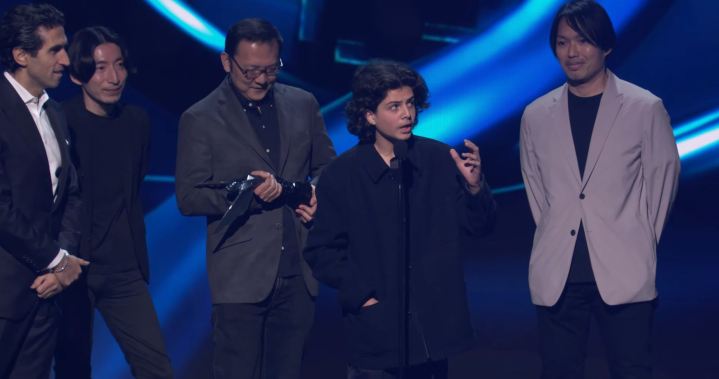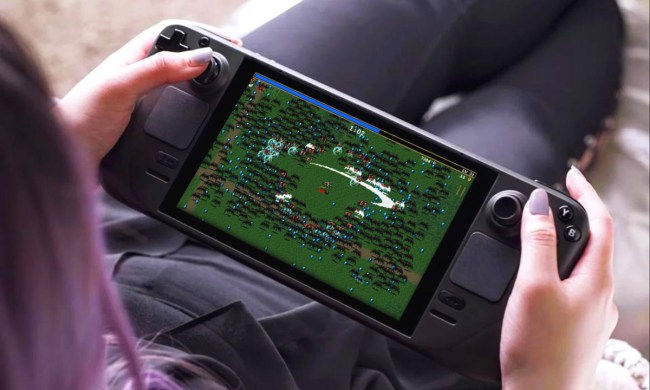If the goal of the modern awards show is to make “moments,” then The Game Awards 2022 certainly rose to the occasion — and then some. The Geoff Keighley-produced ceremony was among the show’s best overall efforts yet, packing in an excellent slate of reveals, some genuine surprises, and enough “WTF” moments to make headlines even at mainstream publications that don’t normally pay attention to the world of gaming.
While it may have been a particularly exciting show for fans and casual viewers, it was an uneven ceremony when it came to the actual awards. Rushed winner announcements and speeches took a back seat to flashy trailers over the course of the night. That certainly isn’t new for the nine-year-old show, which has built its reputation on providing E3-calibur announcements, but awards felt like a noticeably low priority during the broadcast.
That dynamic made for a sometimes disappointing show that didn’t always feel like it functioned as an industry celebration. Instead, it was a night engineered for social engagement — something that wound up being its Achilles heel by the night’s bizarre finale.
The recap
If you tuned into The Game Awards 2022 just to see some new trailers, you likely walked away happy. Keighley was at his best as a curator this year, pulling together an impressive slew of trailers that somehow dodged leaks. A stunning Death Stranding 2 reveal and live appearance by creator Hideo Kojima created one of the show’s most hair-raising moments to date. I was in the Microsoft Theater for the ceremony, and the energy in the room was palpable; it felt historic.
That was far from the show’s only big “world premiere,” though. A fantastic Armored Core VI: Fires of Rubicon debut had attendees screaming, Hades 2 shocked the crowd, and Final Fantasy XVI made for a much stronger closing reveal than Fast & Furious Crossroads or an Unreal Engine 5 tech demo based on The Matrix series. Even Star Wars Jedi: Survivor, which had its release date unceremoniously leaked before the show, got a massive reaction. No announcement had its thunder stolen, allowing the show to feel like a “can’t miss” spectacle.
Though the show would eventually sag in its middle (an awkward Crash Bandicoot segment made for its lowest point), fans seemed satisfied overall. When Geoff Keighley put out a Twitter poll after the ceremony asking viewers to grade the broadcast, players overwhelmingly responded with A’s. If this was meant to be a night for fans, The Game Awards delivered.
If it was meant to be a night for developers, however, the ceremony left much to be desired. The night began promisingly enough with a large emphasis on the Best Performance award, presented by a rather confused Al Pacino. God of War Ragnarok‘s Christopher Judge won and proceeded to deliver an emotional (though awkwardly long) speech that made the trophy feel like an important honor.
That feeling didn’t last. An hour into the show, only a few statues were presented in between trailers. The winners that did wind up taking the stage to accept didn’t get much time to do so. From where I was seated, I could see the central teleprompter, which began flashing “wrap it up” messages almost instantaneously. A low point of the night came when Nintendo’s Doug Bowser came on stage to accept Best Action Game on behalf of Bayonetta 3. After giving a short introduction, he opened a prepared statement from developer PlatinumGames as the show flipped on music to nudge him offstage. It came off as a disrespectful moment for one of the show’s biggest categories.

The Game Awards generally seemed disinterested in handing out awards. Several categories were lumped into rapid-fire segments where five winners were called out in the span of a minute. The winners of those categories did not come on stage to accept their awards, nor was a second of footage from any game shown. If you’d never heard of Moss: Book 2 heading into the show, you certainly didn’t leave knowing anything about it. The final twist of that knife came towards the end, where Keighley rushed through half a dozen of the show’s biggest categories, like Best RPG and Best Independent Game, in an instant and just as quickly tossed to a trailer for Call of Duty: Modern Warfare II‘s new content.
The tension lies in the Game Awards’ mission to be a show “for the fans,” something that feels a bit at odds with the idea of an awards ceremony. Sure, it’s not always exciting to watch developers go up on stage to thank their teams and families, but that’s not the point. Ceremonies like this are supposed to give the people who make art we love a moment to celebrate their wins. It’s an honor to get to see passionate, sincere moments like that — even when they run too long.
Ironically, the show’s lowest moments were debatably the result of the show’s emphasis on fans. The first revolved around this year’s controversial Players Choice category, which sparked a war between Sonic Frontiers and Genshin Impact fans. Both bases accused one another of trying to manipulate the show’s public poll, creating an ugly online discourse. Keighley acknowledged that during the show, noting that the team had to remove bots from the final results before announcing that Genshin Impact was victorious. The result elicited a wave of boos from the crowd, reducing the entire category to high school pettiness. Then there was the show’s bizarre finale.

The ceremony ended with Elden Ring developer FromSoftware taking the stage to accept Game of the Year. At the tail end, one of the people on stage took the microphone to thank his “reformed Orthodox Rabbi Bill Clinton.” Viewers were understandably puzzled. It turned out that the culprit wasn’t a FromSoftware developer but a 15-year-old boy attending the show who simply walked up on stage alongside FromSoftware, evading any security. The whole situation left viewers to debate if it was a funny prank or an anti-Semitic dog whistle. Either way, it was an unnerving security risk that came with the show’s return to a public format.
It was an almost poetic ending: The show ended with a fan overshadowing the people who we were supposed to be celebrating.
Though The Game Awards 2022 delivered a better-paced show full of exciting announcements, it’s certainly worth rethinking who the ceremony is actually for heading into its tenth year. Until it does, “Bill Clinton kid” will be as symbolic a moment for the Game Awards as Josef Fares’ show-defining Oscars rant.




